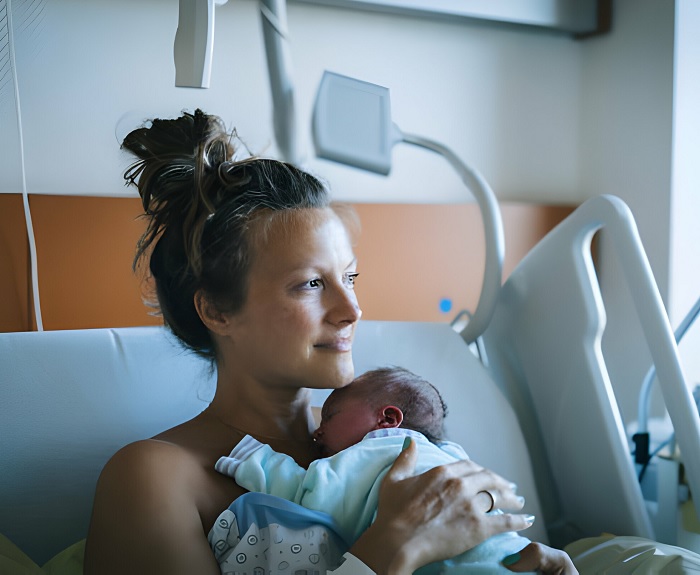Last Updated on January 1, 2025
The best time to become a mother is when you are emotionally, financially, and physically ready to take on the responsibilities of raising a child. It’s essential to consider factors such as career stability, relationship stability, and personal readiness before embarking on motherhood.
While there is no “one size fits all” answer, it’s important for women to make this decision based on their individual circumstances and readiness. Many experts suggest that women should aim to become mothers before the age of 35 to reduce the risk of fertility issues, but ultimately, the best time is when a woman feels prepared and eager to embrace motherhood.
Planning and preparing for motherhood is a deeply personal journey that should be approached with thoughtful consideration and readiness.

Factors To Consider
Determining the ideal time to become a mother involves considering several factors such as financial stability, career goals, and emotional readiness. It’s important to assess these elements to make an informed decision that suits your circumstances.
Becoming a mother is a significant decision that comes with a multitude of factors to consider. From physical health to financial stability, each aspect plays a crucial role in determining the best time to embark on the journey of motherhood. Let’s explore these factors in detail.
Read More – Is It Safe For A Mother To Kiss Her Baby?
Physical Health
Your physical health should be a top priority when contemplating motherhood. A healthy body not only promotes a smooth pregnancy but also ensures a healthier life for both you and your future child. Regular exercise, a balanced diet, and staying up-to-date with medical check-ups are essential for maintaining good physical health. Consulting with your healthcare provider can provide valuable insights into any pre-existing conditions that may impact pregnancy and guide you towards the best time to pursue motherhood.
Financial Stability
Financial stability is another vital consideration when thinking about becoming a mother. Raising a child requires financial resources to ensure their well-being and provide them with a comfortable life. Evaluating your current financial situation and planning for the future can help you determine when you are financially ready to embrace motherhood. Creating a budget, reducing debt, and saving for expenses such as education and healthcare are crucial steps towards achieving financial stability.
Considering these factors can guide you towards determining the best time to become a mother. By prioritizing physical health and achieving financial stability, you can embark on this beautiful journey with confidence and ensure a happier and healthier future for both you and your child. Remember, there is no one-size-fits-all answer to this question. It ultimately depends on your unique circumstances and personal readiness to embrace motherhood.
Read More – How To Deal With Wife And Mother In Law Issues?
Age And Motherhood
Age and motherhood play a crucial role in a woman’s decision to start a family. Whether to become a mother at a younger age or wait until later in life is a deeply personal choice influenced by various factors. Let’s explore the impact of age on motherhood and the advantages it can offer.
Biological Clock
A woman’s biological clock refers to the natural decline in fertility as she ages. The general understanding is that the optimal time for conceiving and carrying a child with lesser medical interventions is in the twenties and early thirties. However, advancements in reproductive technology have provided opportunities for women to conceive at an older age.
Advantages Of Being A Young Mother
- High energy levels and physical stamina to keep up with active kids.
- Opportunity to grow alongside your children, forming a close bond.
- Easier physical recovery after childbirth due to younger age.
Advantages Of Being An Older Mother
- Financial stability and established career before starting a family.
- Emotional maturity and life experience to handle the challenges of motherhood.
- Greater readiness and commitment to raise a child due to personal growth.
Career And Motherhood

When considering the optimal moment to embrace motherhood, it’s crucial to evaluate the impact on your career. Balancing work and family responsibilities can be challenging, but with careful planning and support, women can successfully navigate both worlds. Here’s a closer look at the career implications of becoming a mother:
Balancing Work And Family
Finding balance between a career and motherhood requires meticulous time management. Create a schedule that allows dedicated time for work and family. Employ practical strategies such as delegating tasks, setting boundaries, and embracing flexibility to manage responsibilities effectively.
Career Implications
- Maternity leave: Many women face concerns about taking maternity leave and its potential impact on their careers.
- Career progression: It’s important to address the impact on long-term career goals and aspirations. Taking breaks may affect professional development.
- Workplace support: Seek out companies with family-friendly policies and supportive work environments to help manage the demands of both motherhood and career.
Personal Readiness
When it decides when to become a mother, personal readiness plays a pivotal role. It involves both emotional preparedness and relationship stability. Understandably, each woman has her unique journey and timeline when it comes to starting a family. Let’s delve deeper into these two crucial factors to consider when deciding if it’s the right time to embrace motherhood.
Read More – How To Deal With Parents With Anger Issues?
Emotional Preparedness
Emotional preparedness is an essential aspect of becoming a mother. It involves being in the right state of mind, ready to handle the challenges and joys that come with nurturing and raising a child. The emotional aspect includes stability, self-confidence, and the ability to prioritize the needs of your child while maintaining a healthy balance in your own life.
Being emotionally prepared entails having a strong support system in place, whether it’s through friends, family, or a partner. It’s crucial to assess your emotional well-being and consider if you can provide the love, care, and attention that a child needs. Ready to embark on a life-changing journey, a mother needs to feel confident in her ability to navigate the ups and downs that come with parenthood.
Relationship Stability
In addition to emotional preparedness, relationship stability is another critical factor to consider. The foundation of a solid relationship is essential for raising a child in a secure and loving environment. Whether you are in a committed partnership or considering becoming a single mother, the stability of your relationship, or lack thereof, will significantly impact your journey into motherhood.
Evaluate your relationship through honest introspection and open communication with your partner. Assess whether you share similar values, goals, and parenting styles, as these factors are vital for creating a harmonious and supportive environment for your child. Additionally, it’s important to consider the level of commitment and dedication both you and your partner possess as you embark on this transformative phase of your lives.
Ultimately, the best time to become a mother is a subjective decision that should be based on personal readiness. Take the time to reflect on your emotional preparedness and assess the stability of your relationship. Remember, there is no right or wrong time, but by placing importance on these factors, you can enhance your journey into motherhood with confidence and joy.
Social And Cultural Factors
Social and cultural factors play an influential role when considering the best time to become a mother. These factors, such as societal expectations and cultural norms, shape the decisions and choices women make regarding motherhood.
Expectations And Pressures
In today’s society, there are many social and cultural factors that influence a woman’s decision on when to become a mother. One of the significant aspects to consider is the expectations and pressures imposed by society. From a young age, girls are often exposed to the notion that motherhood is a natural and expected part of their lives. This can create a sense of pressure and expectation to conform to societal norms regarding the ideal age for motherhood.
Depending on personal beliefs and cultural backgrounds, these expectations can vary widely. Some cultures place importance on early motherhood, viewing it as the primary role of women. On the other hand, in more modern and progressive societies, there may be a growing trend towards postponing motherhood as women prioritize career advancements and personal goals. It is essential to acknowledge and analyze these expectations and pressures to make an informed decision about when the best time to become a mother is.
Support Systems
Another crucial aspect to consider when determining the best time to become a mother is the availability of strong support systems. The decision to have a child is often both exciting and daunting, and having the right support in place can greatly influence a woman’s experience of motherhood. Support systems can come in various forms, such as family, friends, partners, and community resources. These networks can provide emotional, practical, and financial assistance during the journey of motherhood.
Having a reliable support system can help alleviate some of the stresses and challenges that come with raising a child. It can also provide a sense of security and confidence, reducing feelings of isolation and overwhelm. Before deciding to embark on the journey of motherhood, it is essential to assess the strength and availability of your support system. Identifying potential gaps and proactively seeking solutions can help ensure a smoother transition into motherhood.
| Pros of strong support systems | Cons of weak support systems |
|---|---|
| – Emotional support | – feeling isolated and overwhelmed |
| – Practical assistance | – lack of assistance with childcare duties |
| – Financial help | – increased financial strain |
When contemplating the best time to become a mother, it is vital to consider the social and cultural factors at play. By recognizing and examining the expectations and pressures placed upon women, as well as ensuring the availability of a reliable support system, women can make a decision that aligns with their personal desires and circumstances. Ultimately, the decision to become a mother is a deeply personal one, and each woman must navigate these factors to determine what is best for her.
Frequently Asked Questions On When Is The Best Time To Become A Mother?
When Is The Right Age To Have A Child?
The right age to have a child varies for each person, but considering factors like health and stability is important.
How Does Career Affect The Decision To Become A Mother?
Career decisions can impact the timing of becoming a mother, as balancing work and family responsibilities is essential.
What Are The Advantages Of Becoming A Mother At A Younger Age?
Becoming a mother at a younger age can offer more energy, potential health benefits, and the opportunity to grow alongside your child.
Is There An Ideal Time To Become A Mother?
There is no one-size-fits-all answer, as the ideal time to become a mother depends on personal circumstances, desires, and readiness.
How Does Age Impact Fertility And The Ability To Conceive?
As women age, fertility declines, making it more challenging to conceive, and increasing the risk of pregnancy complications.
Conclusion
Deciding when to become a mother is a deeply personal choice that can be influenced by various factors such as one’s career, financial stability, and personal goals. What matters most is finding the right time that aligns with your own aspirations and desires.
Ultimately, there is no universally “best” time to embark on motherhood. Trust your instincts, weigh the pros and cons, and make a decision that feels right for you. Remember, motherhood is a unique journey that unfolds differently for everyone.

